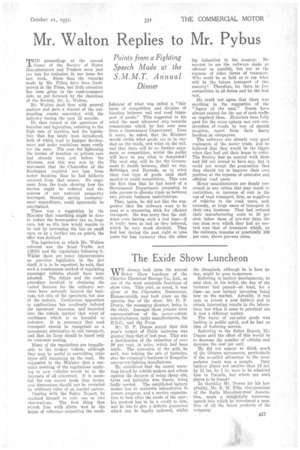Mr. Walton Replies to Mr. Pybus
Page 53

If you've noticed an error in this article please click here to report it so we can fix it.
T"Eproceedings at the annual dinner of the Society of Motor Manufacturers and Traders were just too late for inclusion in our issue for last week. Since then the remarks made by Mr. Pybus have been freely quoted in the Press, but little attention has been given to the road-transport side, as put forward by the chairman of the Society, Mr. L. Walton.
Mr. Walton dealt first with general matters and gave a résumé of the outstanding events connected with the industry during the past 12 months.
Ile then turned to the questions of taxation and legislation, referring to the high rate of taxation and the legislation that has lately been introduced, both of which tend to hamper development and make conditions more, costly for the user. The case for lightening the burden of taxation on private cars had already. been put before the Minister, and this was met by the statement that the Chancellor of the Exchequer required not less from motor taxation than he had hitherto received from that source. No argument from the trade showing how the burden might be reduced and the sources of our national prosperity developed, thereby saving unemployment expenditure, could apparently be entertained.
There was a suggestion by the Ministry that something might be done to reduce the horse-power tax on large cars, but as this loss would require to be met by increasing the tax on small cars, or by a further tax on petrol, the offer was declined.
The legislation to which Mr. Walton referred was the Road Traffic Act (1930) and the regulations following it. Whilst there are many improvements on previeus legislation in the Act itself, it is to be regretted, he said, that such a cumbersome method of regulating Passenger vehicles should have been adopted. The delays and the costly procedure involved in obtaining the varied licences for the ordinary services have seriously injured the business, not only of the operators, but also of the makers. Continuous opposition to applications has needlessly inflated the operators' expenses, and imported into the vehicle market that want of confidence which is so harmful to industry. It is necessary that road transport should be recognized as a permanent alternative to rail transport, and that its fares should be based only on economic costing.
Many of the regulations are inapplicable to the modern vehicle, although they may be useful in controlling older types still remaining on the road. He suggested to the Minister that a constant. combing of the regulations applying to new vehicles would be in the interests of all concerned. It is essential for our expert trade that design mid dimensions .should not be curtailed by arbitrary rules of an insular nature.
Dealing with the Salter Report, he confined himself to only one or two observations. The first thing that struck him with alarm was in the teams of reference respecting the estab
Iishment of what was called a "fair basis of competition and division of function between rail and road transport of goods." This suggested to his mind the most advanced step towards communism which hehad ever seen from a Government Department. Does it mean, he asked, that the Minister would decide what goods are to be carried on the roads, and what on the rail, and that there will be no further argument or competition, whilst the public will have to pay what is demanded? The next step will be for the Government to decide between, shall we say, Selfridges and Harrod, as to what. class and type of goods each shall market to avoid competition. This was the first time that he had heard of a Government Department proposing to take powers to allocate trade as between two private business undertakings.
Then, again, he did not like the suggestion that the railways were to be used as a measuring stick for efficient transport. He was sorry that the railways were having such a bad time—if it really were so bad as they inferred, which he very much doubted. They had lost during the past eight or nine years far less turnover than the other
big industries in the country. He wanted to see the railways made as efficient as possible, but not at the expense of other forms of transport. Who could be so bold as to say what will be the future transport of this country? Therefore, let there be free competition in all forms and let the best win.
He could not agree that there was anything in the suggestion of the "legacy of the past." Roads have always existed for the use of such traffic as required them. Motorists have fully paid for the extra upkeep and new construction of roads, by way of special taxation, apart from their heavy burdens as ratepayers.
The railways are already very good customers of the motor trade, and he believed that they would be far bigger when they had put their house in order. The Society had no quarrel with them and did not intend to have any, but it could not accept the proposition that they should try to improve their own position at the expense of extensive and efficient road users.
Motor manufacturers are deeply concerned in any action that may result in restriction, or increase of cost in the use of road transport, first, as suppliers of vehicles to the road users, and, secondly, as large users of transport in their, own business. They had reduced their manufacturing costs to 20 per cent, below those of pre-war days, the one item over which they had no control was that of transport which, on the railways, remains at practically 100 per cent. above pre-war rates.




































































































